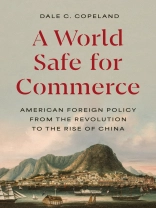An Economist Biggest Book of the Year
How commerce determines whether America preserves the peace or goes to war
When the Cold War ended, many believed that expanding trade would usher in an era of peace. Yet today the United States finds itself confronting not just Russia in Europe but China in the Indo-Pacific, Africa, and Latin America. Shedding new light on how trade both reduces and increases the risks of international crisis, A World Safe for Commerce traces how, since the nation’s founding, the United States has consistently moved from peace to conflict when the commerce needed for national security is under threat.
Dale Copeland shows how commerce pushes the United States and its rivals to expand their spheres of influence for access to goods even as they worry about provoking a breakdown in trade relations that could spiral into military conflict. Taking readers from the wars with Britain in 1776 and 1812 to World War II and the Cold War, he describes how America’s leaders have grappled with this inherent tension, and why they have shifted, sometimes dramatically, from peaceful, mutually beneficial policies to coercion and force in order to increase control over vital trade and prevent economic decline.
A World Safe for Commerce reveals how trade competition could lead the United States and China into full-scale confrontation. But it also offers hope that both sides can work to improve their overall trade expectations and foster the confidence needed for long-term peace and stability.
Sobre o autor
Dale C. Copeland is professor of international relations at the University of Virginia. He is the author of
Economic Interdependence and War (Princeton) and
The Origins of Major War.












